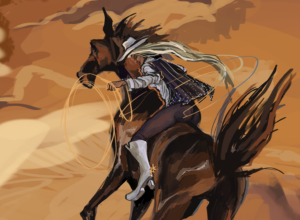For most artists, a sophomore album is a daunting task. The more successful your debut, the higher the stakes are for its follow-up, as fans and critics alike wait with bated breath to determine whether you were just a flash in the pan. Zach Bryan, the genre-transcending and establishment-rejecting singer-songwriter, both acknowledges and resists this pressure, declaring—on the opening track of his eponymous second major label album—“I don’t need a music machine telling me what a good story is.”
Zach Bryan (2023) isn’t technically Bryan’s second album; the artist—whose work spans country, folk, rock, and Americana—has been putting out music independently since 2017, when he was serving in the Navy. After Twitter virality, two homemade albums, and a performance at the Grand Ole Opry, Bryan amassed a cult following and a record deal. Bryan’s prolificacy is astounding; last year, he dropped a 34-song major label debut, American Heartbreak (2022).
However, despite the depth of Bryan’s catalog, his latest album carries the weight of a sophomore release as he continues to ascend meteorically. The album showcases his honest, introspective songwriting, complete with heartbreakingly poetic ballads, mellow and nuanced love songs, and rousing anthems. But more importantly, Zach Bryan finds its creator at an early-career turning point—amid personal controversies, heightened scrutiny, and a politically and culturally fraught music landscape, it remains to be seen whether Bryan’s brand of unfiltered authenticity and self-styled outlawry can weather his transition from little-known indie artist to stadium-selling mainstream star.
The album’s autobiographical first two tracks reveal Bryan’s awareness of his ever-expanding audience. In line with his unconventional approach to all things, the opening number is a poem, helpfully titled “Fear and Friday’s (Poem).” Over absentmindedly strummed guitar chords, Bryan guides listeners through a stirring stream-of-consciousness manifesto of his values and life experiences, from characteristically self-deprecating psychoanalysis (“I am unhinged, unworthy, and distasteful to mostly everyone I meet”) to a declaration that “every waking moment is enough and еxcess never lеads to better things.” The poem is followed by the relatively upbeat “Overtime” which catches new listeners up on Zach Bryan 101: an introduction to his beloved rural Oklahoma hometown; a window into his formative, hardship-filled family history; and a recap of the criticism that’s cemented the ever-present chip on his shoulder, fueling his desire to always “be workin’ overtime.”
“I Remember Everything,” the album’s lead single, is a bittersweet reflection on a past relationship. Bryan is joined by Kacey Musgraves to relive whiskey-fueled nights from contrasting perspectives, backed by melancholy strings and acoustic guitar. The song reached no. 1 on Billboard’s country music chart, an accomplishment recently notched by polarizing, politically charged songs like Jason Aldean’s provocative pro-gun, pro-police “Try That In A Small Town” and, most recently, Oliver Anthony’s “Rich Men North of Richmond,” which rails against corruption in Washington and was embraced by far-right Republicans for its anti-taxation and anti-welfare messaging. The success of these singles, along with the continued dominance of the ever-controversial Morgan Wallen, seemed to suggest that country stars had to wade into the so-called “culture wars” to top the charts.
But Zach Bryan offers an alternative: rather than making sweeping statements about the state of the world, he turns inward. “Jake’s Piano – Long Island,” a two-part downtempo track positioned at the middle of the album, features some of Bryan’s best lyricism to date. In a rambling manner, he digs deep into his insecurities, relationship with substances, and struggles with mental health; his specificity and sense of heart distinguish him from both the cheap controversy-bait and the soulless, formulaic tunes that have come to dominate country music.
Anytime Bryan does venture into social issues, rather than issuing blatant political proclamations, he relies on personal experience. “East Side of Sorrow” finds Bryan processing formative life events, including a poignant recollection of the loss of his mother. But Bryan also looks back on his time in the Navy, expressing skepticism—veiled in reflection—of the institution to which he and several generations of his family have belonged: “18 years old, full of hate / They shipped me off in a motorcade / They said, ‘Boy, you’re gonna fight a war / You don’t even know what you’re fighting for.’” The song pairs vulnerable self-examination with invigorating trumpets as Bryan reminds himself that despite daily hardships, “the sun’s gonna rise tomorrow.”
While the album adds Bryan’s extensive repertoire, he manages to explore a new theme, one that’s a hallmark of sophomore albums: life in the public eye. For instance, on “Ticking,” a standout for its variegated rhythms and lyrics that are both evocative and confessional, Bryan considers the challenges of maintaining relationships—with childhood friends, romantic partners, and himself—amid his new fast-paced lifestyle. He reflects on the destabilization and demands of fame; “wheels runnin’ down the interstate” whisk him to “closed-minded leave-me towns” where “everyone thinks they know [him] now” when all the while, he yearns to get back to his hometown and the woman he loves. And yet, disorientingly, even when he’s home, he finds himself out of place after the seismic life changes he’s experienced over the past few years, as the people around him “talk to [him] like [he’s] still that kid.”
These songs trace a recalibration fans have watched Bryan undergo in real time over the past few months. He positioned himself early on as an anti-establishment rebel, both through his independence from Nashville’s all-powerful Music Row and his presence as an outspoken public figure. But as the industry increasingly recognizes his work and his audience grows, Bryan finds himself under a microscope; as a result, he’s recently walked back several of his most prominent stances.
Most notably, after Ticketmaster’s widely criticized mishandling of Taylor Swift’s Eras Tour sales last fall, Bryan spoke out against the ticketing giant’s monopoly, arguing, “I believe working class people should still be able to afford tickets to shows” and vowing to “prove to people tickets don’t have to cost $450 to see a good and honest show.” On Christmas, he released a live album pointedly titled All My Homies Hate Ticketmaster (2022). Yet a few weeks ago, he tweeted, “All my homies still do hate Ticketmaster but hard to realize one guy can’t change the whole system,” and proceeded to list tickets for his upcoming tour on the platform; fans faced the same exorbitantly high prices and never-ending queues Bryan had originally promised to prevent.
As Bryan adjusts to the realities of fame, he’s also caught flak for seemingly abandoning his authentic small-town image. From dating New York City influencer Brianna “Chickenfry” LaPaglia to a widely publicized arrest where, in body cam footage, Bryan begged to be released on the basis of his celebrity status, some have seen his recent choices as a betrayal of his background. However, the album’s closing tracks, “Smaller Acts” and “Oklahoman Son,” serve as a means of restoring his rural American credibility. On “Smaller Acts,” Bryan harkens back to his earlier releases, featuring the rawest sound on the album and complete with frogs croaking in the background. “Oklahoma Son” is a vivid, unromanticized ode to Bryan’s hometown, where he states, once and for all, that he’ll “always be the Oklahoman son.”
Bryan’s second official album is a triumph of authenticity and self-examination in a concise format, unlike his previous release’s overlong tracklist and inconsistent quality. But beyond his musical development, it’s clear that Bryan is also maturing as a public figure, and the growing pains of that adjustment are one of Zach Bryan’s most interesting, revealing themes. As Bryan continues to gain popularity and garner recognition from the Nashville machine he’s long eschewed, it remains to be seen how both his music and his celebrity will evolve. But maybe that’s the joy of following an emerging artist; as Bryan admits on “Ticking,” “I’m too young to even know myself.”
VOICE’S CHOICES: “East Side of Sorrow,” “Ticking,” “Tradesman”





